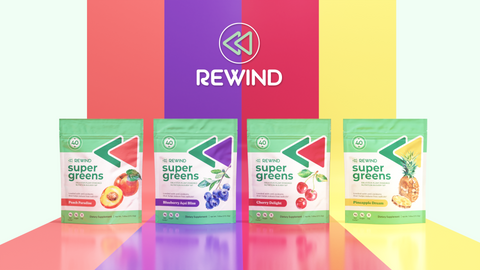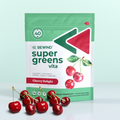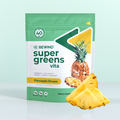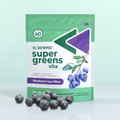
by Erika Albertini, PT, DPT January 19, 2026 6 min read
When it comes to maintaining heart health and promoting longevity, nature has provided some powerful allies - one of which is resveratrol. This potent antioxidant has been making waves in the wellness world for its ability to support cardiovascular function, combat oxidative stress, and even slow down the aging process. While many people associate resveratrol with red wine, you don’t have to pour yourself a glass to enjoy its benefits. By incorporating super greens powders rich in resveratrol into your daily routine, you can give your body the nourishment it needs to thrive.
But what exactly is resveratrol, and how does it work? Let’s dive into its origins, explore the science-backed benefits, and show you how to easily add it to your diet for optimal health and longevity.
Resveratrol is a natural compound found in red grapes, berries, and peanuts. It’s most famous for its presence in red wine, often linked to the "French Paradox" the idea that despite a diet rich in cheese and wine, the French have a relatively low incidence of heart disease. This antioxidant powerhouse belongs to a group of polyphenols known as stilbenes, which plants produce to protect themselves from environmental stressors like fungi and UV radiation.
Today, resveratrol is a key ingredient in manysuper greens powders andgreen juice blends. When combined with nutrient-rich greens like spirulina and wheatgrass, it creates a potent mix that supports overall health, particularly when it comes to heart function and longevity.
One of the most researched benefits of resveratrol is its ability to promote cardiovascular health. Studies suggest that it helps maintain flexible blood vessels by supporting nitric oxide production, which allows arteries to relax and improve circulation. Better circulation means a lower risk of high blood pressure and heart-related complications.
Nitric oxide is a crucial molecule in the body that signals blood vessels to expand, improving oxygen and nutrient delivery to tissues. Resveratrol has been shown to enhance endothelial function, which is essential for preventing arterial stiffness and maintaining proper vascular tone. By improving blood vessel flexibility, resveratrol can reduce strain on the heart, lowering the risk of hypertension and reducing the likelihood of blood clots. Additionally, improved circulation supports brain function, muscle recovery, and overall vitality, making resveratrol a valuable addition to a heart-healthy lifestyle.
If you’re looking to support your heart withsuper greens, resveratrol is a must-have ingredient. Research indicates that resveratrol may help balance cholesterol by increasing HDL (good cholesterol) while reducing LDL (bad cholesterol). It also appears to prevent oxidation of LDL, which is a key factor in plaque buildup within arteries.
HDL cholesterol plays a crucial role in cardiovascular health by transporting excess cholesterol from the bloodstream to the liver, where it can be processed and removed from the body. Higher levels of HDL are associated with a lower risk of heart disease, making resveratrol’s ability to boost HDL particularly beneficial.
LDL cholesterol, on the other hand, is often referred to as "bad cholesterol" because when it oxidizes, it can contribute to plaque formation in the arteries. This plaque buildup can lead to atherosclerosis, a condition that restricts blood flow and increases the risk of heart attacks and strokes. Resveratrol’s antioxidant properties help prevent this oxidation, reducing the chances of arterial blockages and improving overall heart health.
Furthermore, some studies suggest that resveratrol may also influence cholesterol metabolism by regulating key enzymes involved in lipid processing, potentially contributing to a healthier lipid profile over time.
Your body is constantly battling oxidative stress, a process that contributes to aging and chronic disease. Resveratrol acts as a powerful antioxidant, neutralizing free radicals and helping to reduce inflammation, a major contributor to heart disease. When combined withgreens juice ingredients like bilberry, blueberry, and green tea extract, its antioxidant power is amplified.
Free radicals are unstable molecules that can damage cells, leading to premature aging and chronic conditions like heart disease, diabetes, and neurodegenerative disorders. Antioxidants like resveratrol help counteract these harmful molecules, protecting cells from oxidative damage. By reducing oxidative stress, resveratrol supports overall cellular health, enhances immune function, and helps slow down age-related decline.
Additionally, resveratrol’s anti-inflammatory properties may help reduce chronic inflammation, a key driver of many degenerative diseases. Chronic inflammation has been linked to cardiovascular disease, arthritis, and even cognitive decline. Studies suggest that resveratrol may inhibit the activation of inflammatory pathways, further reinforcing its role as a protective compound.
When consumed alongside other antioxidant-rich superfoods, such as those found insuper greens powders, resveratrol’s effects are even more potent. Ingredients like bilberry and blueberry provide additional polyphenols, while green tea extract delivers catechins, further boosting the body’s ability to combat oxidative stress and maintain long-term health.
There’s a reason why resveratrol is often called the "longevity molecule." Research suggests that it activates a family of proteins called sirtuins, particularly SIRT1, which plays a role in aging and metabolism. These proteins influence cellular repair, mitochondrial function, and overall energy balance; factors that contribute to a longer, healthier life.
Animal studies have shown promising results. Mice and other organisms given resveratrol-rich diets exhibited increased lifespan and improved resistance to age-related diseases. While human studies are still ongoing, the connection between resveratrol and longevity remains an exciting area of research.
While you could sip on a glass of red wine every evening, a more practical and alcohol-free way to boost your resveratrol intake is through super greens powders. These nutrient-dense blends often include resveratrol alongside other antioxidant-rich superfoods like spinach, broccoli, and green tea extract, creating a more balanced and consistent way to support overall health.
Adding a scoop of greens juice to your daily routine delivers a powerful dose of antioxidants and phytonutrients in one easy-to-mix blend. Whether you enjoy it in a simple glass of water, a morning smoothie, or mixed with almond or oat milk, it’s an effortless way to make resveratrol part of your daily nutrition.
Here are a few additional ways to naturally increase your resveratrol intake:
By choosing super greens powders like Rewind Greens and whole plant foods, you can enjoy the benefits of resveratrol without relying on wine - supporting heart health, cellular protection, and overall wellness in a simple, sustainable way.
Resveratrol is a powerhouse antioxidant that supports heart health, promotes longevity, and helps protect your body from oxidative stress. By incorporating it into your daily routine throughsuper greens powders, you can enjoy its incredible benefits without relying on red wine or specific foods alone.
One of the easiest ways to do this is withRewind Greens Powders, which contain resveratrol along with other essential superfoods to help you feel your best every day.
Resveratrol is a natural compound found in red grapes, berries, and peanuts. It is most famous for its presence in red wine and is known for its antioxidant properties. Plants produce resveratrol to protect themselves from environmental stressors like fungi and UV radiation. Today, it is a key ingredient in many super greens powders and green juice blends.
Resveratrol promotes cardiovascular health by maintaining flexible blood vessels and supporting nitric oxide production. This helps improve circulation, reduce the risk of high blood pressure, and lower the likelihood of heart-related complications. It also supports healthy cholesterol levels by increasing HDL (good cholesterol) and reducing LDL (bad cholesterol).
Yes, resveratrol is a powerful antioxidant that neutralizes free radicals and reduces inflammation, which are major contributors to heart disease and chronic conditions. By reducing oxidative stress, resveratrol supports overall cellular health and enhances immune function.
Research suggests that resveratrol activates proteins called sirtuins, particularly SIRT1, which play a role in aging and metabolism. These proteins influence cellular repair, mitochondrial function, and overall energy balance, contributing to a longer, healthier life. Animal studies have shown promising results in increased lifespan and improved resistance to age-related diseases.
While resveratrol is present in red wine, a more practical and alcohol-free way to boost your intake is through super greens powders. These nutrient-dense blends often include resveratrol alongside other superfoods like spinach, broccoli, and green tea extract. Adding a scoop of greens juice to your daily routine provides a powerful dose of antioxidants and phytonutrients.


Cherry Delight Vita
$49.99

Pineapple Dream Vita
$49.99

Blueberry Acai Bliss Vita
$49.99